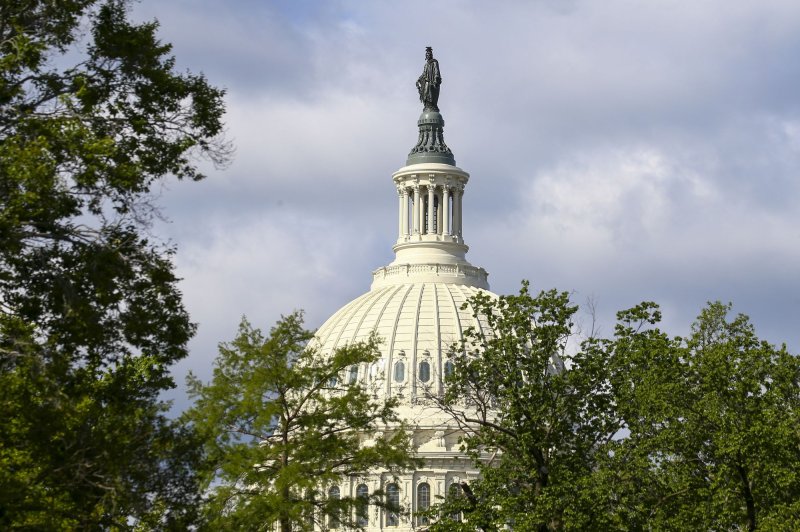The U.S. Capitol building is seen in Washington, D.C., on May 12. The full House has yet to return to the complex to conduct in-person business. Photo by Tasos Katopodis/UPI |
License Photo
May 27 (UPI) -- The House on Wednesday scrapped a vote to reauthorize surveillance authorities under the Foreign Surveillance Act, as it carried out the first proxy votes in its history.
The move to cancel the vote came after President Donald Trump urged Republicans in the House to vote against the bill on Tuesday, before threatening to veto the measure on Wednesday.
"If the FISA bill is passed tonight on the House floor, I will quickly VETO it," Trump wrote on Twitter. "Our country has just suffered through the greatest political crime in its history. The massive abuse of FISA was a big part of it!"
The House previously passed the reauthorizations 278-136 in March, but the measure was sent back to the chamber after the Senate adopted an amendment providing increased protections for targets for FISA warrants.
Earlier in the day, the House conducted its first proxy vote, voting 413-1 in favor of legislation calling for sanctions against Chinese officials for the detention of Uighur Muslims in the Xinjiang region.
More than 70 House Democrats designated to have another lawmaker cast their vote.
The House passed the resolution earlier this month allowing lawmakers unable to travel to Washington, D.C., to designate another representative as a proxy to cast votes on their behalf for the first time in its 200-year history.
The measure passed by a vote of 217-189 and received no support from Republican lawmakers.
The House has not returned from its coronavirus-imposed recess in March, while the Senate returned earlier this month with restrictions. The House implemented the new policy over concerns the pandemic restrictions might severely impact its ability to function, as there are more than 400 House members compared to just 100 in the Senate.
Proxy voting is designed to enable lawmakers to conduct legislative business if they are unable to be physically present in Washington, D.C., whether it be due to illness, transportation trouble or another coronavirus-related issue.
No Republican designated proxies and House Republican leader Kevin McCarthy and 20 other GOP lawmakers filed a lawsuit Tuesday challenging the proxy voting method as unconstitutional.
"This is not simply arcane parliamentary procedure. It is a brazen violation of the Constitution, a dereliction of our duty as elected officials and would silence the American people's voice during a crisis," McCarthy, R-Calif., said. "Although I wish this matter could have been solved on a bipartisan basis, the stakes are too high to let this injustice go unaddressed."
House Speaker Nancy Pelosi dismissed the lawsuit as a "sad stunt" and accused Republicans of trying to delay and obstruct legislation that would be helpful to Americans at a time of crisis.
"The House made its will clear two weeks ago when it voted to implement remote voting by proxy and other necessary measures to ensure that Congress can continue to protect lives and livelihoods," she said. "The House's position that remote voting by proxy during a pandemic is fully consistent with the Constitution is supported by legal analyses.
"Further, the Supreme Court made clear over a century ago that the Constitution empowers each chamber of Congress to set its own procedural rules."
Proxy voting in the House is a temporary measure and must again be authorized after a 45-day period.
The House has never before allowed proxy voting on the chamber floor but used to permit proxy voting in committee as recently as 1995.















